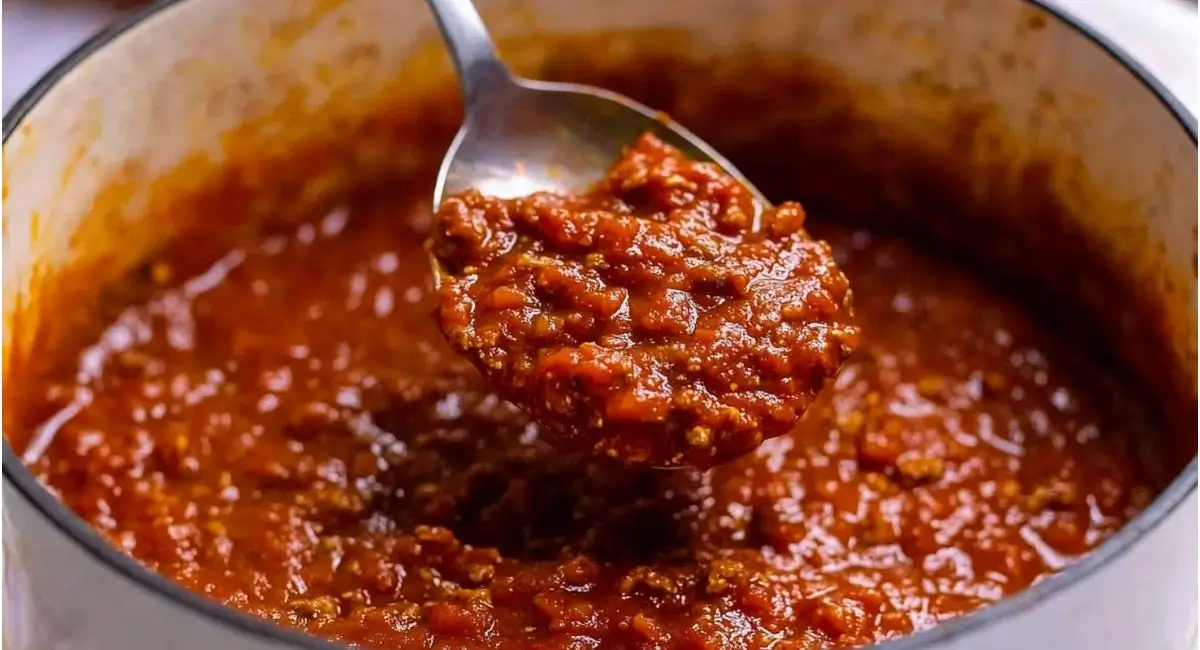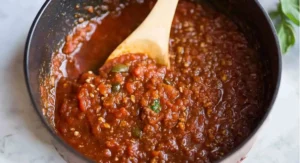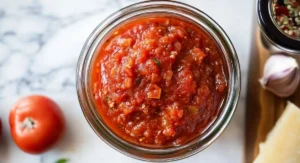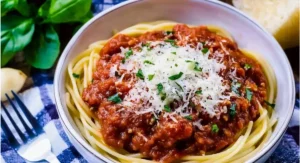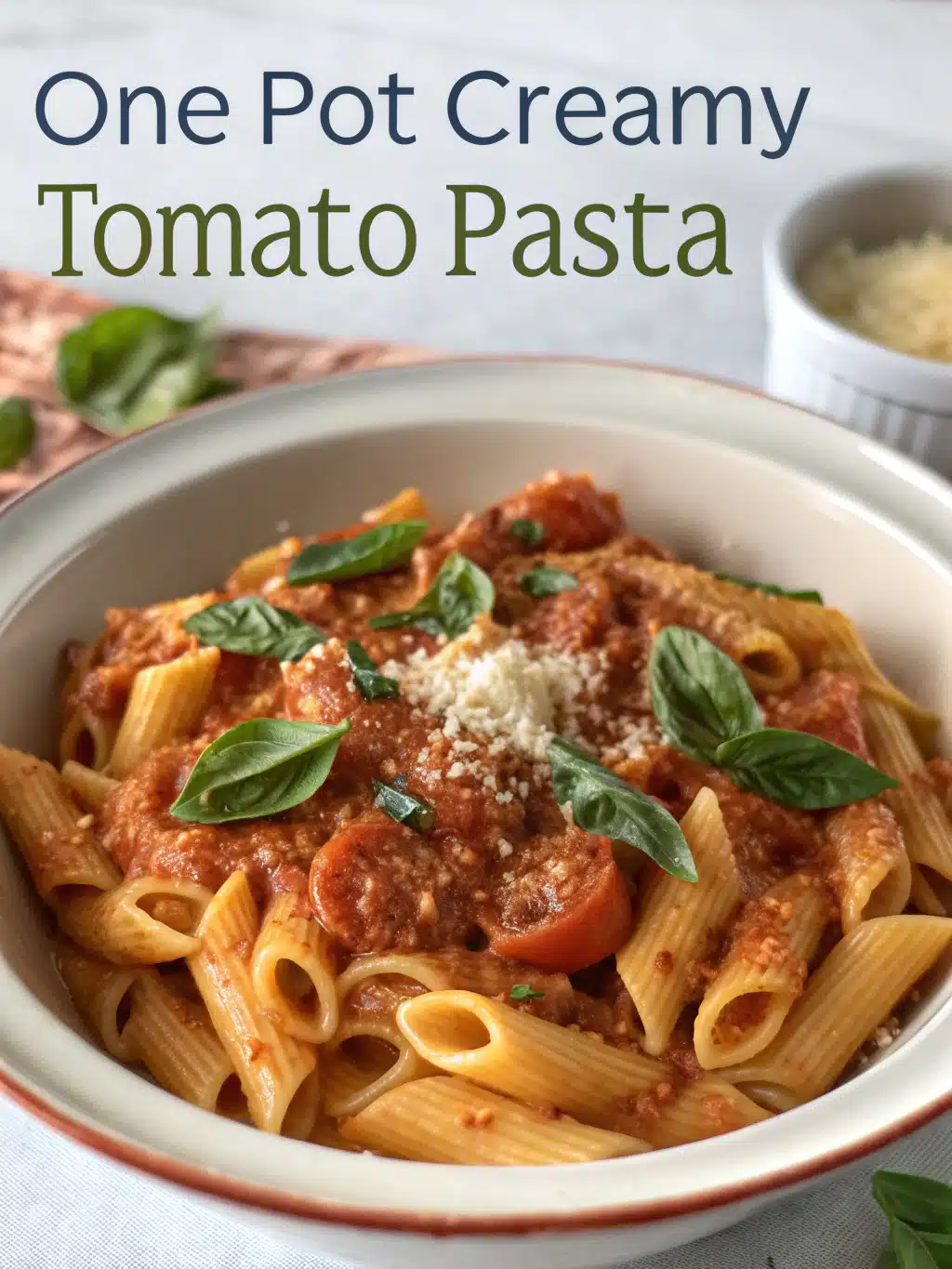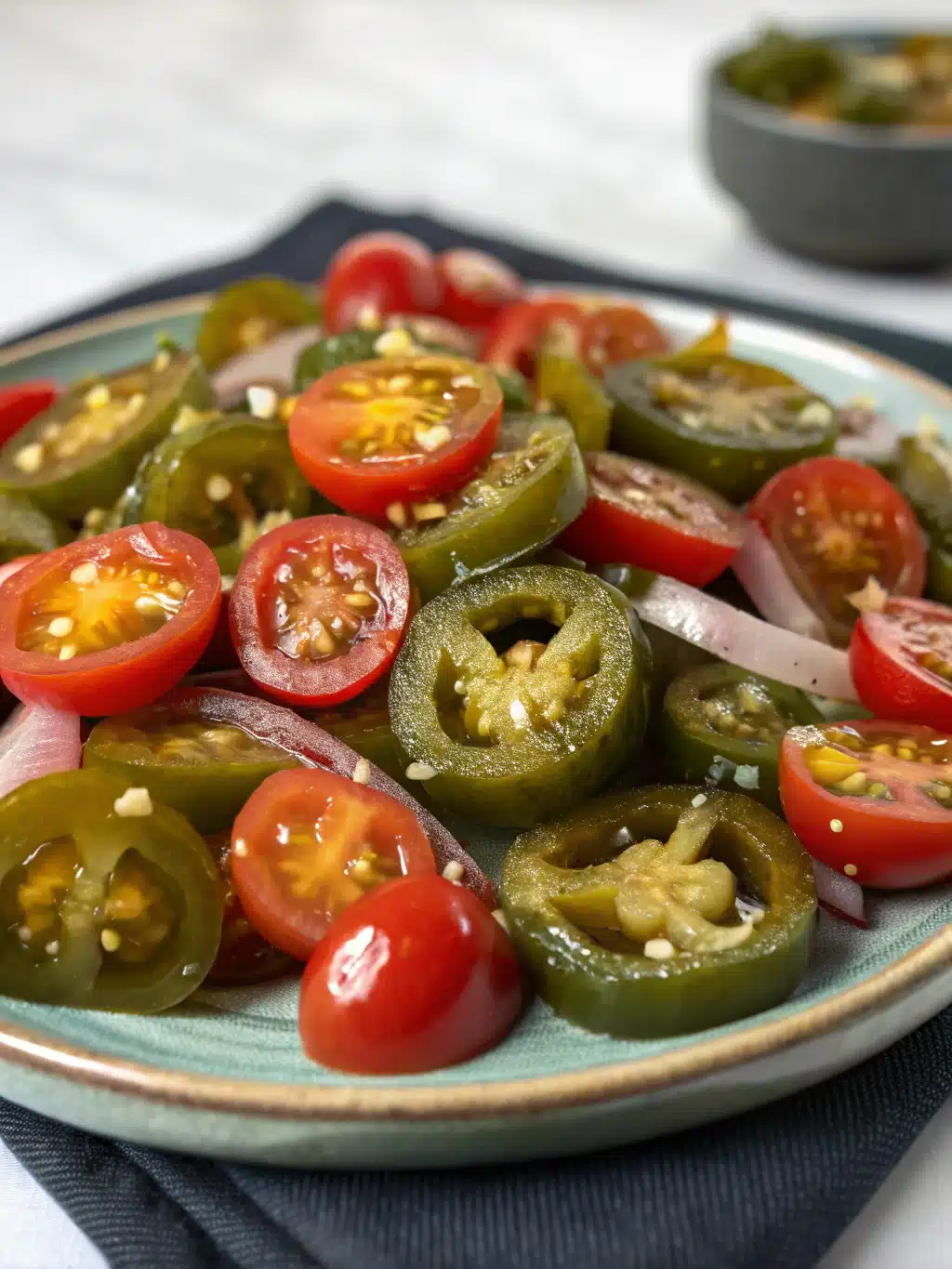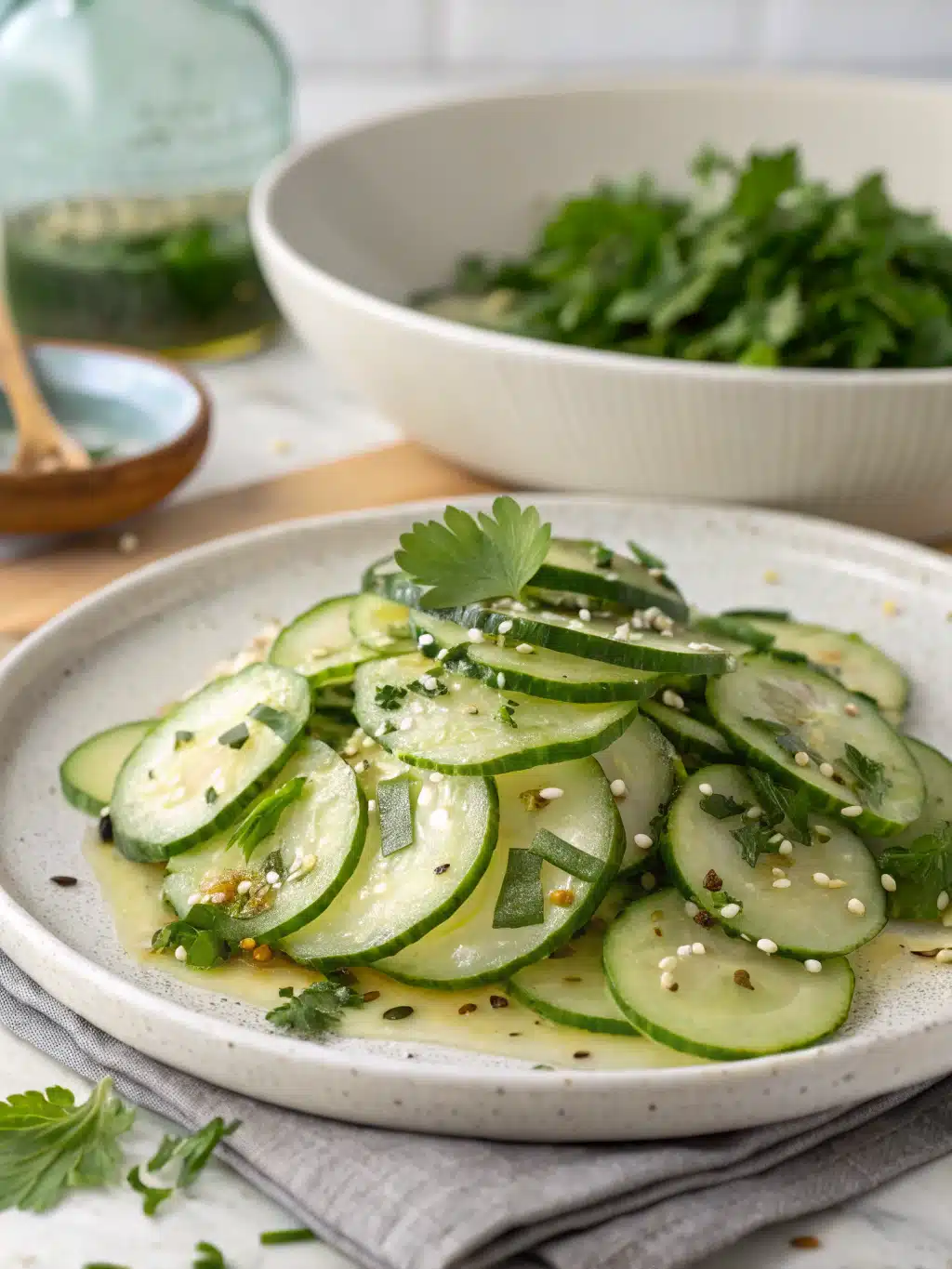Estimated reading time: 8 minutes
There is nothing more comforting than the aroma of homemade spaghetti sauce simmering on the stove! Whether you’re crafting a cozy family dinner or prepping a hearty meal for later, making your own sauce from scratch delivers unbeatable flavor, endless customization, and a true taste of tradition.
In this guide, you’ll discover how to make a rich, savory spaghetti sauce that’s simple enough for beginners, yet delicious enough to impress.
Table of contents
Why Make Homemade Spaghetti Sauce? The Flavor Difference
You might wonder, is it really worth the effort when there are so many options on the grocery store shelves? The answer is a resounding YES. Here’s why:
- Unbeatable Flavor: Homemade sauce develops a depth of flavor that comes from slowly simmering ingredients, allowing the herbs, spices, aromatics (like garlic and onion), and tomatoes to meld together beautifully. You can’t replicate this with quick processing.
- Quality Ingredients: You choose exactly what goes in. Use high-quality canned tomatoes, fresh garlic, fragrant herbs, and good olive oil. This makes a noticeable difference in the final product.
- Dietary Needs & Preferences: Easily adapt the recipe for vegetarian, vegan, gluten-free, or low-sodium diets. Hide extra veggies for picky eaters or crank up the spice if you like heat.
- Cost-Effective: Making sauce from canned tomatoes is often cheaper than buying premium jarred sauces, especially when you make a large batch.
- Sense of Accomplishment: There’s a genuine pride in serving a delicious meal knowing you made the sauce from scratch.
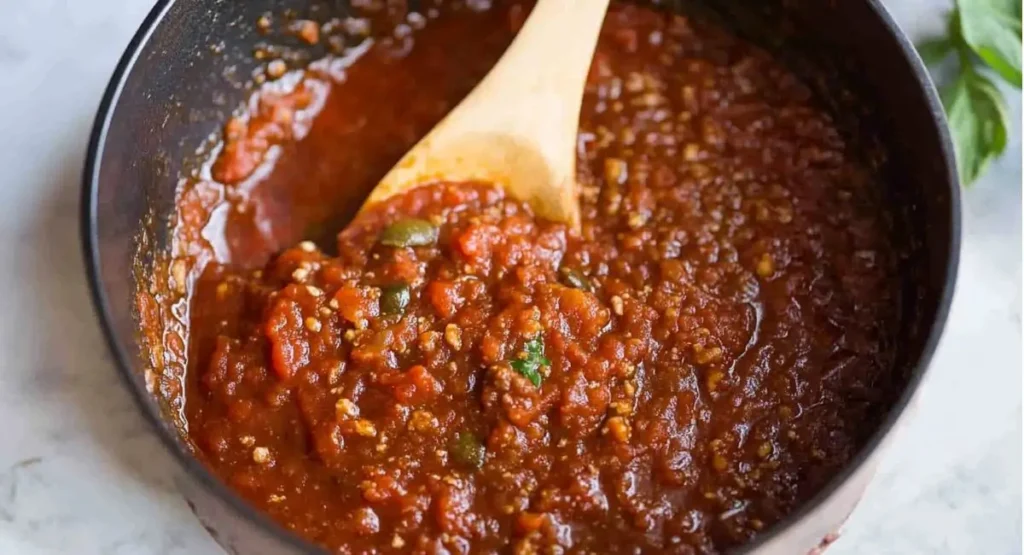
Ingredients:
- Olive Oil: 2-3 tablespoons (Extra virgin or regular)
- Onion: 1 large, finely chopped (Yellow or white)
- Garlic: 4-6 cloves, minced (Use fresh garlic for the best flavor!)
- Crushed Tomatoes: 2 x 28-ounce cans (High-quality San Marzano or other good brand are recommended for their sweetness and lower acidity)
- Tomato Paste: 6 ounces (Adds richness and depth)
- Water or Broth: 1-2 cups (Use water, vegetable broth, or beef broth depending on desired richness and whether making a meat sauce)
- Dried Oregano: 1 tablespoon
- Dried Basil: 1 tablespoon
- Dried Thyme (Optional): 1 teaspoon (Adds another layer of flavor)
- Red Pepper Flakes (Optional): 1/2 teaspoon (For a little kick)
- Bay Leaf: 1 (Adds subtle complexity)
- Salt: 1-2 teaspoons, or to taste
- Black Pepper: 1/2 tea-spoon, or to taste
- Sugar (Optional): 1 teaspoon to 1 tablespoon (To balance acidity, if needed)
- Fresh Basil (Optional): A handful of fresh leaves, torn, added at the end
Equipment For Homemade Spaghetti Sauce Recipe:
- Large, heavy-bottomed pot or Dutch oven (Essential for even heating and preventing scorching during simmering)
- Wooden spoon or heatproof spatula
- Measuring cups and spoons
- Cutting board and knife
- Garlic press or grater (optional)
Step-by-Step Instructions:
Total Time: 1 hour
u003cstrongu003eSauté the Aromaticsu003c/strongu003e
Heat some olive-oil in a big pot on medium heat. Add chopped-onions and cook them until they are soft, which will take about 03 to 04 minutes. Then, add the garlic and cook for 01 more minute until you can smell it.
u003cstrongu003eBrown the Meat (Optional)u003c/strongu003e
If using meat, add ground beef or Italian sausage to the pot. Break it up with a spoon and cook until-browned. Drain any excess grease.
u003cstrongu003eAdd Tomatoes and Seasoningsu003c/strongu003e
Stir in crushed tomatoes, tomato paste, diced tomatoes, sugar, basil, oregano, salt, pepper, red pepper flakes, and the bay leaf.
u003cstrongu003eSimmer for Flavoru003c/strongu003e
Bring the sauce to a simmer, then-reduce the heat to low. Cover loosely and let it simmer for at least 30 minutes, stirring occasionally. The longer it simmers, the richer the flavor!
u003cstrongu003eTaste and Adjustu003c/strongu003e
Before serving, remove the bay leaf. Taste and adjust-seasoning if needed — add a pinch more salt, sugar, or herbs to perfect it.
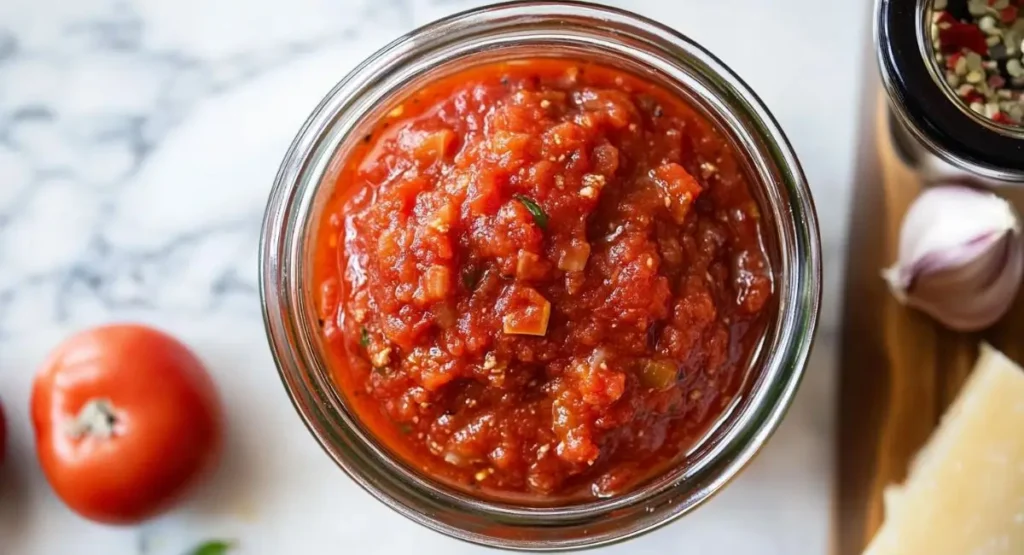
Tips for the Perfect Homemade Spaghetti Sauce
Making great sauce isn’t just about following a recipe; it’s about understanding the process.
- Simmering is Key: We mentioned it in the instructions, but it bears repeating. Simmering-allows the flavors to meld and deepen. It also helps to reduce the sauce, concentrating the tomato flavor and thickening it naturally. Don’t rush this step if you have time.
- Quality of Tomatoes Matters: Canned crushed tomatoes are the backbone of this sauce. Investing in good quality brands (like imported San Marzano or reputable domestic brands) will make a significant difference in the final taste due to better ripeness and lower acidity.
- Don’t Burn the Garlic: Garlic adds wonderful flavor, but burnt garlic is bitter and can ruin a sauce. Cook it just until fragrant, a minute or two, after the onions have softened.
- Balance is Everything: Tomatoes are acidic. Learning to balance that acidity with sweetness (from cooked onions, a pinch of sugar, or sometimes carrots), fat (olive oil or butter), and salt is crucial for a well-rounded sauce. Taste and adjust!
- Fresh Herbs for Finishing: While dried herbs are great for simmering and building flavor, stirring in fresh basil or oregano right at the end brightens the sauce with a fresh, aromatic punch.
- Scrape the Bottom: While sautéing onions and garlic, and especially when adding tomato paste, be sure to scrape the bottom of the pot. Those browned bits (fond) add incredible flavor to the sauce.
Variations: Customize Your Homemade Spaghetti Sauce Recipe
This base recipe is incredibly versatile. Here are some ways to adapt it:
- Vegetarian Version: Skip the meat and add sautéed mushrooms for a hearty texture.
- Meat Lovers’ Style: Use a blend of ground beef and Italian sausage.
- Gluten-Free: Naturally gluten-free! Just serve it over your favorite GF pasta.
- Hidden Veggies: Blend in carrots, spinach, or zucchini for picky eaters.
Storage and Freezing Your Homemade Sauce
One of the best things about homemade sauce is making a big batch!
- Cooling: Always let the sauce cool completely before storing it. Transferring hot sauce directly into containers and then refrigerating or freezing can affect its quality and isn’t good for your appliance.
- Refrigeration: Store cooled sauce in airtight containers or jars in the refrigerator for up to 4-5 days.
- Freezing: This sauce freezes beautifully!
- Once completely cooled, transfer the sauce to freezer-safe containers, heavy-duty freezer bags, or even ice cube trays (for small portions).
- Leave some headspace in containers as liquids expand when frozen.
- Label with the date.
- Frozen sauce can last for 4-6 months for best quality.
- To thaw, transfer the container to the refrigerator-overnight, or gently reheat from frozen in a pot on the stove-over low heat, stirring frequently.
- Canning: For long-term pantry storage, you can pressure can homemade meat sauce or water bath can marinara/vegetable-only sauces (ensure sufficient acidity). Follow tested, up-to-date canning guidelines from reliable sources like the National Center for Home Food Preservation.
Serving Suggestions
This versatile sauce is perfect for:
- Classic Spaghetti or other pasta shapes (fettuccine, penne, ziti)
- As a base for Lasagna or Baked-Ziti
- On Meatball Subs
- With Chicken or Eggplant Parmesan
- For dipping Garlic Bread or Mozzarella Sticks
- Over Polenta
Troubleshooting Common Issues
Even experienced cooks encounter issues. Here’s how to fix common problems:
- Sauce is Too Thin:
- Simmer uncovered for a longer time to allow excess-liquid to evaporate and the sauce to reduce.
- Make a slurry of 1-2 tablespoons of tomato paste mixed with a little hot water or broth, and stir it into the simmering sauce.
- Sauce is Too Thick:
- Stir in more water, broth, or even a splash of red wine until it reaches your desired consistency. Do this gradually.
- Sauce is Too Acidic:
- Add a pinch (1/4 to 1/2 teaspoon) of sugar at a time, stirring & tasting until the acidity is balanced.
- Stir in a tablespoon or 02 of unsalted butter at the end. The fat helps mellow the acidity.
- Very carefully, you can add a tiny pinch (1/8 teaspoon) of baking soda. It will fizz, but it neutralizes acid effectively. Use sparingly!
- Sauce Tastes Bitter:
- This can sometimes be related to acidity (address with tips above).
- Ensure your garlic didn’t burn at the beginning.
- A long, slow simmer often helps meld and mellow flavors, resolving bitterness over time.
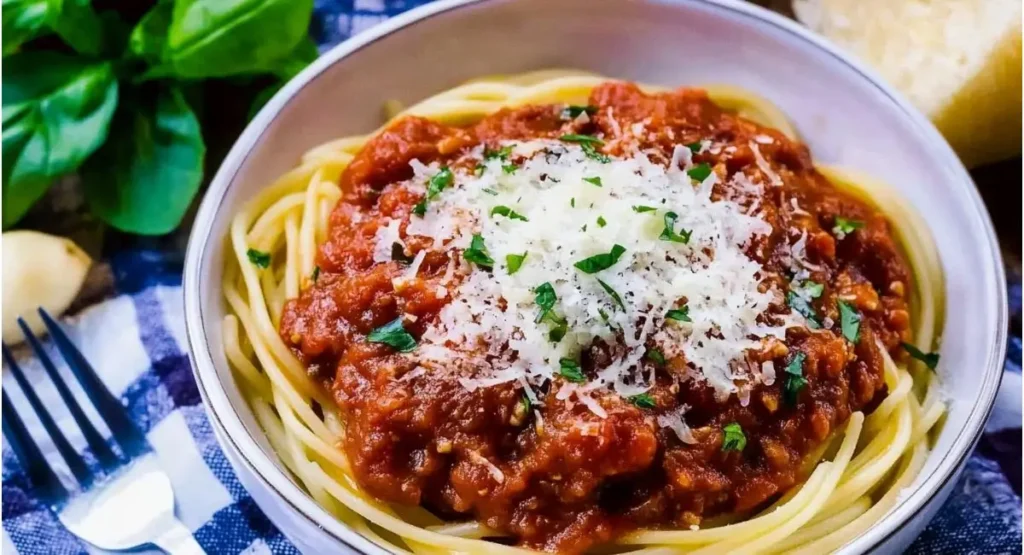
FAQ: Your Homemade Spaghetti Sauce Questions Answered
u003cstrongu003eHow long should homemade spaghetti sauce simmer?u003c/strongu003e
Ideally 30–45 minutes for rich flavor, but longer (even up to 2 hours) is even better.
u003cstrongu003eHow do you thicken homemade spaghetti sauce?u003c/strongu003e
Simmer uncovered to allow water to evaporate, or stir in a small amount of tomato paste.
u003cstrongu003eCan I make it in a slow-cooker?u003c/strongu003e
Of course! First, cook the onions and garlic in a pan until they are soft. Then, brown the meat in the same pan. After that, put everything into a slow cooker. Cook it on a low setting for 6 to 8 hours.
u003cstrongu003eCan I freeze homemade spaghetti sauce?u003c/strongu003e
Yes! Cool it completely, portion it out, and freeze for-up to 03 months.
u003cstrongu003eCan I add sugar to homemade spaghetti sauce?u003c/strongu003e
Yes, absolutely. While not always necessary with high-quality tomatoes and sufficient simmering, a small amount of sugar (1 teaspoon to 1 tablespoon) can help balance the acidity of the tomatoes without making the sauce overtly sweet.
Conclusion
Making your own homemade spaghetti sauce is easier than you think and the results are absolutely worth it. Once you taste the difference fresh ingredients and a little simmering love can make, you’ll never reach for a jar again!
Whip up a big batch and enjoy the versatility of this delicious, comforting sauce in countless meals all week long! Give this recipe a try and let us know how it turns out in the comments below! What’s your favorite variation?
Related Recipes You Might Enjoy
Did You Make This Recipe!
There are no reviews yet. Be the first one to write one.
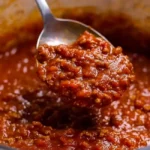
Homemade Spaghetti Sauce
- Total Time: 1 hour
- Yield: 6
Description
A rich, flavorful spaghetti sauce made from scratch with simple ingredients. Perfect for pasta, lasagna, or as a base for other Italian dishes.
Ingredients
- Olive Oil: 2-3 tablespoons (Extra virgin or regular)
- Onion: 1 large (finely chopped (Yellow or white))
- Garlic: 4-6 cloves (minced (Use fresh garlic for the best flavor!))
- Crushed Tomatoes: 2 x 28-ounce cans (High-quality San Marzano or other good brand are recommended for their sweetness and lower acidity)
- Tomato Paste: 6 ounces (Adds richness and depth)
- Water or Broth: 1-2 cups (Use water, vegetable broth, or beef broth depending on desired richness and whether making a meat sauce)
- Dried Oregano: 1 tablespoon
- Dried Basil: 1 tablespoon
- Dried Thyme (Optional: 1 teaspoon (Adds another layer of flavor))
- Red Pepper Flakes (Optional: 1/2 teaspoon (For a little kick))
- Bay Leaf: 1 (Adds subtle complexity)
- Salt: 1-2 teaspoons (or to taste)
- Black Pepper: 1/2 teaspoon (or to taste)
- Sugar (Optional: 1 teaspoon to 1 tablespoon (To balance acidity, if needed))
- Fresh Basil (Optional: A handful of fresh leaves, torn, added at the end)
Instructions
Sauté the Aromatics
- Heat some olive-oil in a big pot on medium heat. Add chopped-onions and cook them until they are soft, which will take about 03 to 04 minutes. Then, add the garlic and cook for 01 more minute until you can smell it.
Brown the Meat (Optional)
- If using meat, add ground beef or Italian sausage to the pot. Break it up with a spoon and cook until-browned. Drain any excess grease.

Add Tomatoes and Seasonings
- Stir in crushed tomatoes, tomato paste, diced tomatoes, sugar, basil, oregano, salt, pepper, red pepper flakes, and the bay leaf.
Simmer for Flavor
- Bring the sauce to a simmer, then-reduce the heat to low. Cover loosely and let it simmer for at least 30 minutes, stirring occasionally. The longer it simmers, the richer the flavor!

Taste and Adjust
- Before serving, remove the bay leaf. Taste and adjust-seasoning if needed — add a pinch more salt, sugar, or herbs to perfect it.

Notes
Tomato Quality: Use high-quality tomatoes like San Marzano for the best flavor.
Simmering Time: Longer simmering enhances the sauce’s depth.
Acidity Balance: A small amount of sugar can reduce tomato acidity.
Customization: Feel free to add mushrooms, bell peppers, or other vegetables.
- Prep Time: 15 minutes
- Cook Time: 45 minutes
- Category: Main Course
- Cuisine: Italian

